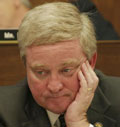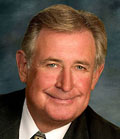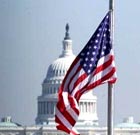|
|
|
Supreme Court takes campaign issue ads cases
Law Center |
2007/01/20 05:03
|
| The US Supreme Court Friday granted certiorari in five cases and ordered all briefings on a challenge to the limits on pre-election advertisements introduced as part of the Bipartisan Campaign Reform Act (BCRA) upheld by the Supreme Court in 2003 to be completed by April 18. The two consolidated cases, FEC v. Wisconsin Right to Life, Inc., et al. (06-969) and McCain, et al. v. Wisconsin Right to Life, Inc., et al. (06-970), stem from a District Court ruling that advocacy groups must be allowed to run issue ads in the two-months period immediately prior to elections. |
|
|
|
|
|
|
Judge: Lawsuit Against XM May Proceed
Court Watch |
2007/01/20 04:59
|
A lawsuit in which record companies allege XM Satellite Radio Holdings Inc. is cheating them by letting consumers store songs can proceed toward trial, a judge ruled Friday after finding merit to the companies' claims. U.S. District Judge Deborah A. Batts made the finding in a case brought by Atlantic Recording Corp., BMG Music, Capitol Records Inc. and other music distribution companies against the licensed satellite radio broadcaster. In a lawsuit last year, the companies said XM directly infringes on their exclusive distribution rights by letting consumers record songs onto special receivers marketed as "XM + MP3" players. XM has argued it is protected from infringement lawsuits by the Audio Home Recording Act of 1992, which permits individuals to record music off the radio for private use. The judge said she did not believe the company was protected in this instance by the act. In a statement, XM said it remains confident that the lawsuit is without merit and it will prevail. "At this stage of the proceeding, the court's ruling is required to be based on the false characterizations set forth in the plaintiffs' complaint. The real facts strongly support our view that the lawsuit is barred by the Audio Home Recording Act. We look forward to making our case in court," the company said. Messages for comment left with lawyers on both sides were not immediately returned. In refusing to toss out the lawsuit, the judge noted that the record companies consent to XM's use of their copyrighted material solely for the purposes of providing a digital satellite broadcasting service. She said XM operates like traditional radio broadcast providers who cannot offer an interactive service, publish programming schedules prior to broadcast and play songs from an artist more often than specified within a three-hour period. But by broadcasting and storing copyrighted music for later recording by the consumer, the judge said XM is both a broadcaster and a distributor, but only paying to be a broadcaster. "The record companies sufficiently allege that serving as a music distributor to XM + MP3 users gives XM added commercial benefit as a satellite radio broadcaster," Batts said. Although XM argued in court papers that an XM + MP3 player is much like a traditional radio-cassette player, the judge said "it is not." "It is manifestly apparent that the use of a radio-cassette player to record songs played over free radio does not threaten the market for copyrighted works as does the use of a recorder which stores songs from private radio broadcasts on a subscription fee basis," she said. XM shares fell 70 cents, or 4.3 percent, to $15.75 in midday trading on the Nasdaq Stock Market. |
|
|
|
|
|
|
Apple Hit With Patent-Infringement Lawsuit
Breaking Legal News |
2007/01/20 04:52
|
The Mountain View, Calif., maker of controller chips for PCs and LCD monitors has filed a patent infringement lawsuit against Apple (AAPL), claiming the IT giant has been unfairly using Opti technology in its Macintosh line and its Xserve servers. Specifically, the lawsuit claims that Apple used Opti-patented "predictive snooping" technology, which involves the transfer of data from a PCI bus controller to a PCI master bus. This piece of technology helps shorten the delay in data transfer within a microprocessor. "The complaint alleges that Apple has infringed the patents by making, selling and offering for sale desktop and portable computers and servers incorporating Predictive Snooping," Opti said in a statement. The lawsuit was nearly identical to one Opti filed against Advanced Micro Devices (AMD) in November. The three U.S. Patent numbers referenced in the two lawsuits were also the same: 5,710,906; 5,813,036; and 6,405,291. All three patents refer to "Predictive Snooping of Cache Memory for Master-Initiated Accesses." The lawsuit was filed in U.S. District Court for the Eastern District of Texas on Jan. 18. The lawsuit seeks a jury trial and unspecified damages, according to the Opti statement.
|
|
|
|
|
|
|
Ex-Congressman Sentenced to 30 Months in Prison
Court Watch |
2007/01/19 17:11
|
| Former US Rep. Bob Ney (R-OH) was sentenced Friday to 30 months imprisonment for receiving gifts and campaign contributions in exchange for political favors. Ney pleaded guilty last October to conspiracy and making false statements in relation to his dealings with lobbyist Jack Abramoff. In response to the political corruption scandal, the Republican congressman resigned from the US House of Representatives in November. Ney's prison sentence will include two years of probation and a $6,000 fine. If he completes a prison alcohol rehabilitation program to address his recently-acknowledged alcohol abuse problem, his sentence could be reduced by up to a year. During sentencing proceedings, Ney's defense team provided evidence that he was a "functioning alcoholic" whose decision-making ability was clouded by his dependency on alcohol. US District Judge Ellen Segal Huvelle rejected the claim, asserting that it didn't fully explain his corrupt behavior or excuse violating laws he was "sworn to enforce and uphold." |
|
|
|
|
|
|
Klein to join law firm BLG as business adviser
Legal Business |
2007/01/19 17:01
|
| Less than a week after leaving provincial politics, former Alberta premier Ralph Klein has joined a top law firm to advise clients on business opportunities in the booming province. Ralph Klein, the former Alberta premier whose grip on office earned him the sobriquet King Ralph, has gone from reigning to making rain. The one-time TV reporter and high-school dropout announced yesterday he is joining national law firm Borden Ladner Gervais LLP as senior business adviser, just one month after resigning as premier and three days after relinquishing his seat in the Alberta Legislative Assembly. Although not licensed to practise law, Mr. Klein says he will act as a resource for BLG lawyers working on files of key personal interest, such as energy development, health care reform and the evolution in securities law, among other things -- "although I need to bone up a bit on securities legislation." Klein will devote about spend two-thirds of his time to the law firm and be based out of its Calgary office. He is working with former Newfoundland premier Brian Tobin to develop an energy policy for the Fraser Institute and he’s joining another conservative think-tank, the Manning Centre for Building Democracy. Klein will be a guest lecturer in the fall at the prestigious Woodrow Wilson International Center for Scholars in Washington, D.C. The former premier also has commitments to be executive in residence at the University of Alberta, and chair of communications at Calgary’s Mount Royal College. |
|
|
|
|
|
|
Fenwick & West Announces 2007 Partnership Class
Law Firm News |
2007/01/19 14:18
|

Fenwick & West LLP announced that it has elected two associates to join the Firm's partnership, effective January 1, 2007. The new equity partners are Blake W. Martell and Heather N. Mewes.
"We are honored to welcome Heather and Blake as our newest partners,commented Gordon K. Davidson, Chairman. Blake and Heather are exemplary attorneys who are dedicated to our clients and the firm. They are invaluable counselors to their clients, and their continued contributions will further strengthen and grow the firm. Blake W. Martell. Blake is a member of the Equity Compensation and Employee Benefits Group. Blake's practice focuses on corporate governance and disclosure; tax, securities and accounting treatment with respect to equity awards and plans and other compensatory arrangements for both publicly traded and privately held companies. He is also active in the firm's M&A practice regarding equity compensation matters and employment agreements. Blake received his LL.M. in taxation from New York University School of Law, his J.D. from the University of San Francisco School of Law, and a B.A. in European history from the University of California, Davis.
Heather N. Mewes. Heather is a member of the Litigation Group. Her practice focuses primarily on patent litigation, but also includes other substantive areas of intellectual property law such as copyright and trade secrets. Heather's experience in patent litigation encompasses a variety of technological fields, including contact lenses, DNA FISH probes, semiconductors, computer graphics and electronic bingo games. Heather received her J.D. from the University of California, Berkeley School of Law (Boalt Hall), and a B.S. in foreign service from Georgetown University.
About Fenwick & West Established in 1972, Fenwick & West works closely with technology and life sciences companies that are changing the world through innovation, and the investors that finance them. The firm has more than 30 years of experience crafting innovative solutions to the business challenges that arise at the intersection of technology and the law. Fenwick & West clients, who range from start-up ventures to global enterprises, value our attorneys' deep industry experience and understanding of their technologies. More information about the firm's expertise is available at www.fenwick.com.
|
|
|
|
|
|
|
Ethics reform bill approved by Senate
Law Center |
2007/01/19 14:16
|
| The US Senate passed the Legislative Transparency and Accountability Act of 2007 by a 96-2 vote Thursday, but declined to create a Senate Office of Public Integrity to investigate ethics breaches. The bill was the first major initiative taken by the Senate in the new Democrat-dominated session of Congress. The measure regulates lobbying activities by preventing lawmakers from accepting gifts and travel from lobbyists, requiring stricter reporting of lobbying activity, preventing spouses of lawmakers from lobbying the Senate and extending the period a former senator must wait before undertaking lobbying activities to two years. The final text passed by the Senate, however, did not include a provision which would have required disclosure of grass-roots lobbying. Senators voted 55-43 not to include that provision in the bill. The bill also requires clearer reporting of home state projects, denies pension benefits to those convicted of serious crimes and requires lawmakers to pay the full price fare when traveling on chartered planes. Opponents of the bill complained the measure discouraged free speech by deterring petition drives, but majority leader Sen. Harry Reid (D-NV) called the measure "the most significant legislation in ethics and lobbying reform we've had in the history of this country." |
|
|
|
|
|
|
Class action or a representative action is a form of lawsuit in which a large group of people collectively bring a claim to court and/or in which a class of defendants is being sued. This form of collective lawsuit originated in the United States and is still predominantly a U.S. phenomenon, at least the U.S. variant of it. In the United States federal courts, class actions are governed by Federal Rules of Civil Procedure Rule. Since 1938, many states have adopted rules similar to the FRCP. However, some states like California have civil procedure systems which deviate significantly from the federal rules; the California Codes provide for four separate types of class actions. As a result, there are two separate treatises devoted solely to the complex topic of California class actions. Some states, such as Virginia, do not provide for any class actions, while others, such as New York, limit the types of claims that may be brought as class actions. They can construct your law firm a brand new website and help you redesign your existing law firm site to secure your place in the internet. |
Law Firm Directory
|
|







